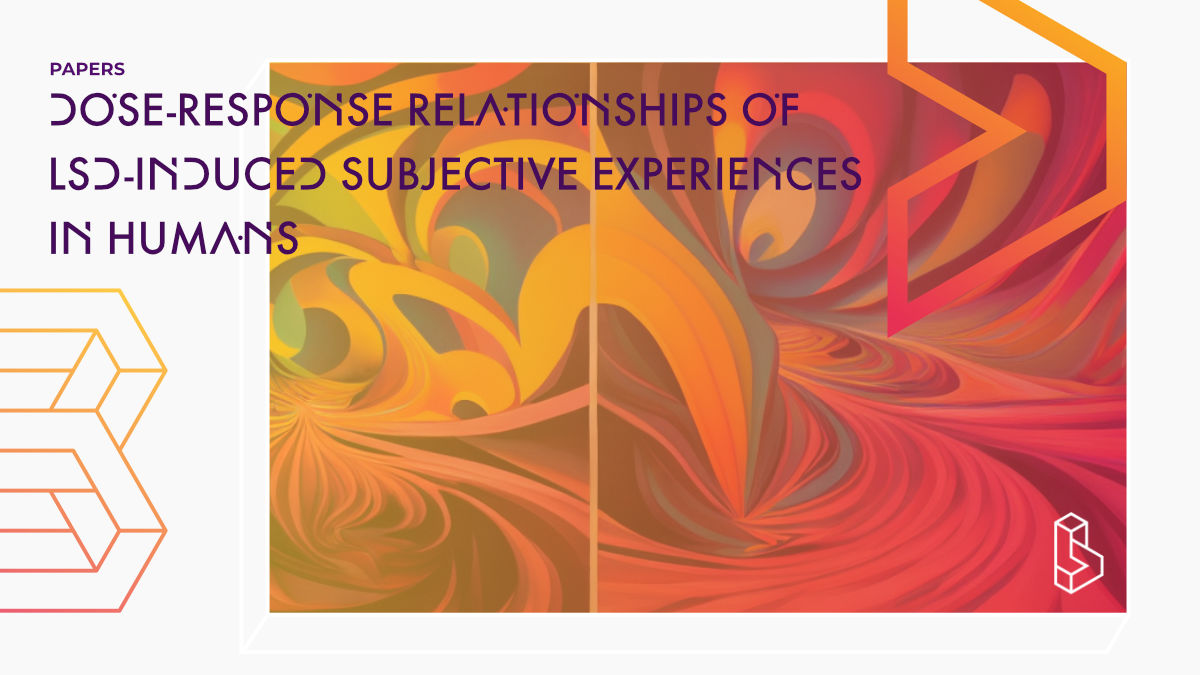This study (n=322) analyses data from previous studies to assess the dose-response relationship and outcomes on the Altered States of Consciousness Rating Scale (ASC) and the Mystical Experience Questionnaire (MEQ) following LSD (25μg to 200μg) administration. Increasing doses were positively correlated with ratings on most factors and scales of the questionnaires, with the strongest responses for visionary phenomena such as audio-visual synesthesia and altered imagery, followed by positively perceived ego dissolution comprising depersonalization and derealization phenomena.
Abstract of Dose-response relationships of LSD-induced subjective experiences in humans
“Lysergic acid diethylamide (LSD) is a potent classic serotonergic psychedelic, which facilitates a variety of altered states of consciousness. Here we present the first meta-analysis establishing dose-response relationship estimates of the altered states of consciousness induced by LSD. Data extracted from articles identified by a systematic literature review following PRISMA guidelines were obtained from the Altered States Database. The psychometric data comprised ratings of subjective effects from standardized and validated questionnaires: the Altered States of Consciousness Rating Scale (5D-ASC, 11-ASC) and the Mystical Experience Questionnaire (MEQ30). We performed meta-regression analyses using restricted cubic splines for data from studies with LSD doses of up to 200 μg base. Most scales revealed a sigmoid-like increase of effects, with a plateauing at around 100 μg. The most strongly modulated factors referred to changes in perception and illusory imagination, followed by positively experienced ego-dissolution, while only small effects were found for Anxiety and Dread of Ego Dissolution. The considerable variability observed in most factors and scales points to the role of non-pharmacological factors in shaping subjective experiences. The established dose-response relationships may be used as general references for future experimental and clinical research on LSD to compare observed with expected subjective effects and to elucidate phenomenological differences between psychedelics.”
Authors: Tim Hirschfeld, Johanna Prugger, Tomislav Majić & Timo T. Schmidt
Summary of Dose-response relationships of LSD-induced subjective experiences in humans
LSD is the prototype of classic serotonergic psychedelics, a group of substances that unfold their psychoactive properties predominantly via the serotonin 2A (5-HT2A) receptor. Psychedelic experiences can be characterized by various subjective experiences and differ from the pharmacodynamical profiles of other 5-HT2A agonists.
LSD was accidentally discovered to have psychedelic properties in 1943 by the Swiss pharmacologist Albert Hofmann. Since then, LSD has been extensively studied in basic science and clinical research as a therapeutic tool, with most intensively studied indications including alcoholism and existential distress in life-threatening physical illness.
Find this paper
Dose-response relationships of LSD-induced subjective experiences in humans
https://doi.org/10.1038/s41386-023-01588-2
Open Access | Google Scholar | Backup | 🕊
Cite this paper (APA)
Hirschfeld, T., Prugger, J., Majić, T., & Schmidt, T. T. (2023). Dose-response relationships of LSD-induced subjective experiences in humans. Neuropsychopharmacology, 2022-11.
Study details
Compounds studied
LSD
Topics studied
Neuroscience
Study characteristics
Meta-Analysis
Participants
322
Humans
Institutes
Institutes associated with this publication
Charité – Universitätsmedizin BerlinThe MIND Foundation recently announced a partnership with Charité – Universitätsmedizin Berlin.
Compound Details
The psychedelics given at which dose and how many times
LSD 25 - 200μg | 1x

